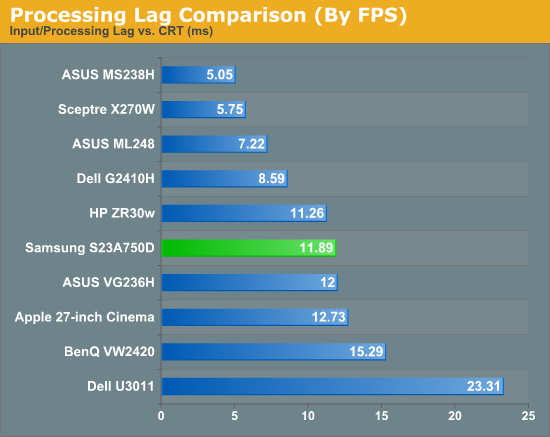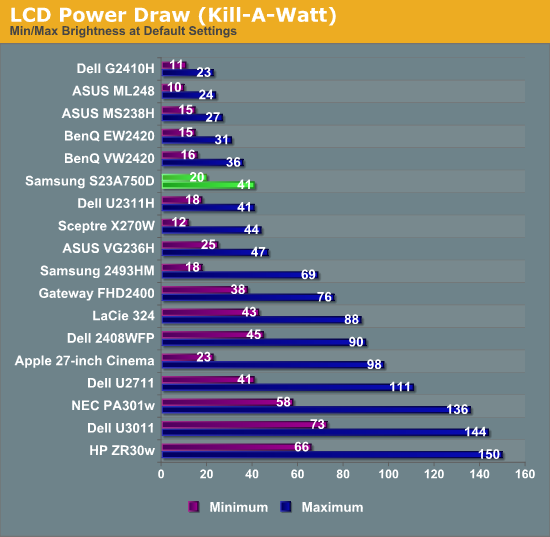Samsung S23A750D 3D LCD Display
by Chris Heinonen on December 17, 2011 2:45 PM ESTSamsung S23A750D Lag and Power Usage
Measuring lag on the Samsung was much easier than most panels. Typically when taking shots of an LCD next to a CRT monitor, the FPS numbers on the LCD will be blurry in a shot at least half the time. This is since we’re running at 60Hz and only shooting at 3-4 times that rate, so often we are between frames. With the 120Hz rate of the Samsung, almost all of my images were sharp and clear, which made this bench test much easier than usual.

Our overall lag would typically be less than 1 frame, since we usually deal with a 60Hz LCD, but in this case it was just over 1 frame since it is a 120Hz display. This is still a little better than most displays, and the faster refresh means that even if you have a frame of lag, that next frame is coming twice as fast as it would with a typical 60Hz display, so the effect should feel like less. I also tried to increase the response time of the display through the menu but had no change in the lag results.
The power use of the Samsung was a bit higher than a normal LCD, though this could easily be due to the 120Hz refresh rate that uses more power. Samsung doesn’t make a 60Hz version so there’s no way to check for certain that it’s the cause of the use. The power use was still very reasonable for the display size.











80 Comments
View All Comments
Boogaloo - Sunday, December 18, 2011 - link
I agree. I probably wouldn't have said anything for fear of coming across as a douche, but since you said it first I feel a little more justified. It reads like a high schooler wrote it, or an educated ESLer.The0ne - Tuesday, December 20, 2011 - link
As I've said before, the reviews here are better than most places but they are still written for the masses. In this respect they are meant for the common, average Joe. Writing a technical review or article is nothing like this, I should know I do this for a living. But if they were most people would probably fall asleep. Might as well pick up a technical journal or magazine. Some people are glad it's not like that and some people are not.Blogging mixed with technical reviews is a touchy subject and while I don't really like them I can live with them knowing that they are not meant to be the same as what I do for work.
zdw - Saturday, December 17, 2011 - link
Any chance you have a Mac with Displayport there?I'd love to know if a display like this will work at 120Hz on a Mac.
cheinonen - Saturday, December 17, 2011 - link
I did hook it up to my Macbook Air (I hook everything up to my Air actually), and it ran at 120Hz just fine I believe. I can't check anymore, but I believe with 99% certainty that it did.tzhu07 - Saturday, December 17, 2011 - link
Glossy. Deal-breaker. The end.aranyagag - Sunday, December 18, 2011 - link
If I wanted to have a mirror to shave with I could get a mirror a lot cheaper than $400. I've switched over to my tablet for most things because I find all these reflections very annoying.cheinonen - Saturday, December 17, 2011 - link
It could be dependent on how it operates at 60 Hz vs 120 Hz. If it runs at 120 Hz when fed a 60 Hz signal, but just repeats the same signal twice, you would expect identical results. If it runs at 60 Hz, the decay time could be slower than 120 Hz possibly. It's unlikely, but without being able to test both, there is no way to know for certain.Conficio - Saturday, December 17, 2011 - link
The first graph in the Color uniformity is titled BenQ...Threnx - Saturday, December 17, 2011 - link
Is there a technical limitation that prevents an IPS panel from displaying 120hz? I can never go back to TN panels...ananduser - Sunday, December 18, 2011 - link
TIME...that is the limitation, be patient, soon 120Hz IPS will be available. :)